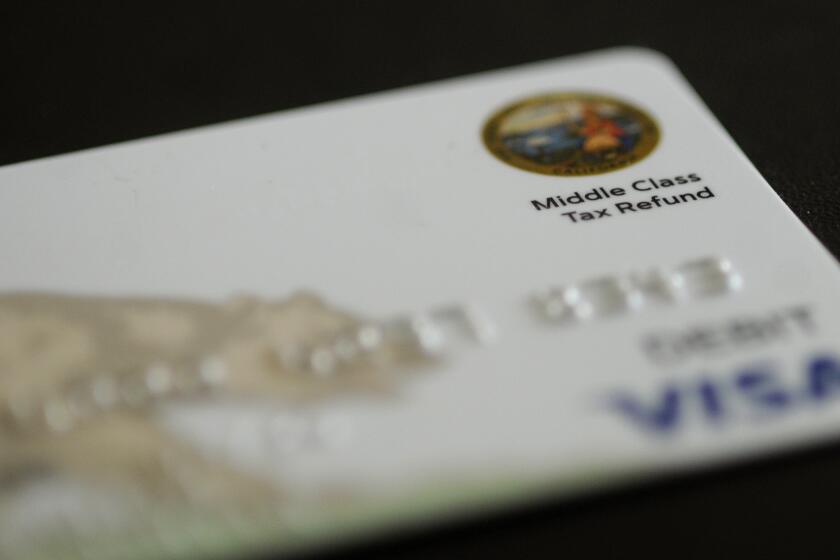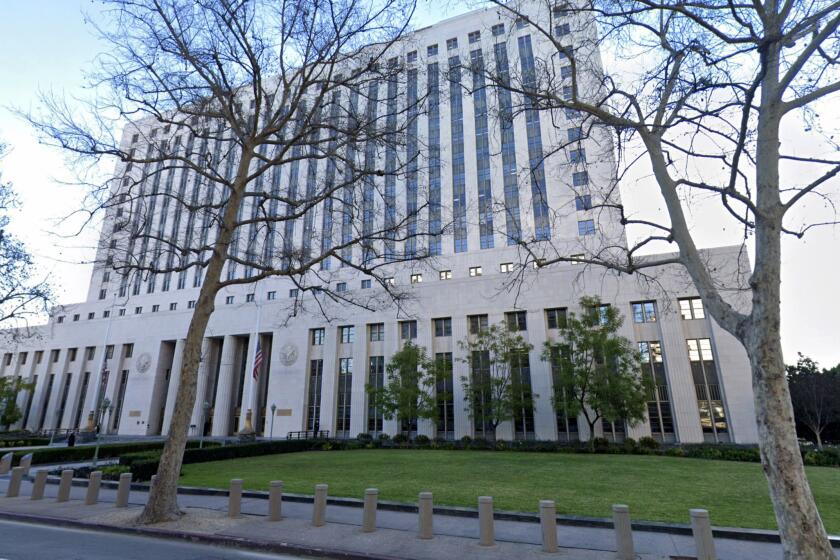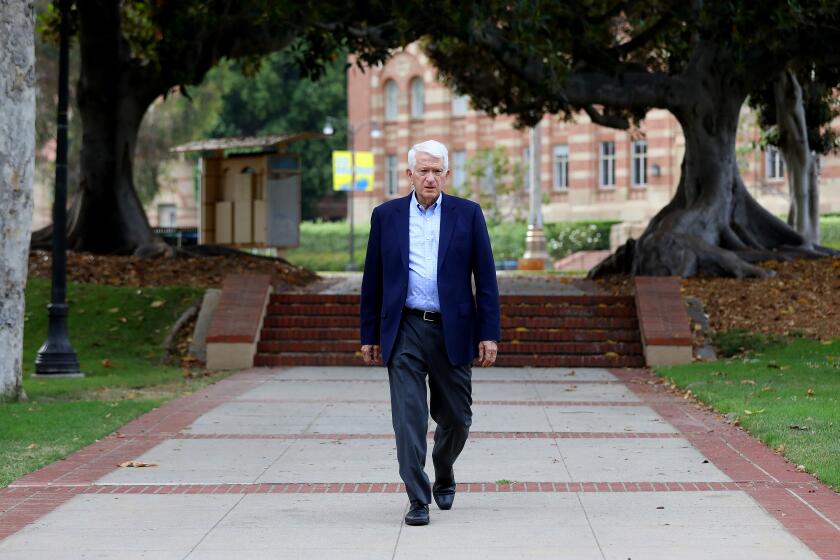COLUMN ONE : Miserable With the Legal Life : More and more lawyers hate their jobs, surveys find. Commercial pressure, burnout and a glut of rivals are blamed.
He earns $150,000 a year at a prestigious law firm, owns a home in an upscale neighborhood and drives a sports car. But the 31-year-old Los Angeles defense lawyer is so unhappy that he is considering chucking his law career and doing something else.
“I look around this firm and see so many people making very good money and being so miserable,” he said.
Disenchantment with the legal life is so pervasive among lawyers that many were not surprised when prosecutor Christopher A. Darden recently questioned whether he wanted to try another case after the high-pressure O.J. Simpson murder trial.
Although Darden may simply be frustrated by the difficulty of prosecuting a celebrated, well-heeled and popular defendant, survey after survey has found that a growing percentage of lawyers despise their jobs.
They tend to be more troubled than other professionals by severe depression and drug and alcohol abuse, studies have found. Eleven percent of lawyers polled in North Carolina in 1991 admitted they consider taking their lives at least once a month. In California, a quarter of attorneys are on inactive status with the State Bar and no longer pay dues, up from 10% in 1980.
Many lawyers trace their disillusionment to the practice of law itself. Pressure to make money and win big cases has transformed the legal culture, many lawyers say, turning the profession into more of a sink-or-swim business. For some, the art of wooing clients has become more valued than crafting effective legal arguments.
“It’s a war out there,” a Los Angeles entertainment lawyer said matter-of-factly.
Some lawyers also probably should not have entered the profession in the first place. Law schools in recent years became what one former lawyer called “the great dumping ground for liberal arts majors,” churning out reluctant warriors ill-suited to the constant acrimony of battle and drudgery of motions.
“I knew I needed another degree past a bachelor’s,” the successful entertainment lawyer said, “and law school seemed as good a choice as any.”
A RAND Corp. study last year concluded that California attorneys were “profoundly pessimistic” about the law, with only half indicating that they would choose again to be a lawyer. Seven in 10 lawyers responding to a 1992 California Lawyer magazine poll said they would change careers if the opportunity arose.
Law school applications peaked in 1990, and some statistics suggest that lawyers may be leaving in greater numbers to become teachers, real estate agents or, like Richard Gottfried, psychotherapists.
“Aspects of myself that I like weren’t being called upon enough” in 10 years of law practice, said Gottfried, 38, who counsels primarily lawyers in West Los Angeles. “There was perhaps an over-emphasis of the intellectual, the combative and the competitive.”
Attorneys tend to be high achievers and perfectionists who pay too little attention to relationships and try to intellectualize problems, he said. Some studies, he added, suggest that the incidence of chemical dependency among legal professionals might be as much as 50% higher than for the general population.
*
Also, a 1990 Johns Hopkins University study found that lawyers are more likely to be severely depressed than members of 103 other occupations. (After them come secretaries and school counselors.)
The low public image of lawyers doesn’t help. “Just at a dinner party last night,” Gottfried said, “the wife of a lawyer told me she didn’t feel good when her husband would say he was a lawyer.”
Despite the negative image, Elizabeth Brodersen believes that she gave up status, as well as financial rewards, in return for greater happiness as a publications director for the American Conservatory Theater in San Francisco.
She earns one-fourth of what she would be making had she stayed in the law and believes strangers now treat her with less deference.
“There was a certain reaction I would get whenever I would say I was an attorney, especially as a woman,” Brodersen said. “Now when I say to someone that I am a writer and do publications for a theater, they say, ‘OK.’ But if the conversation continues and I happen to mention I was an attorney, people are impressed.”
Brodersen, 35, had worked in a corporate law firm in San Francisco where the long hours and stress made her ill. A graduate of Columbia University Law School, she quit the law in 1991 after she paid off her student loans.
“I really enjoyed law school,” she said. “It was intellectually very challenging. But when I got into practice, I realized it was very commercial.”
Now she loves researching such topics as Greek burial rites and the history of Moors for theater productions. But “there is still a little voice in my head saying, ‘Why couldn’t you stick it out like everyone else and make all that money and have a lot more prestige.’ ”
That little voice may explain why many lawyers stay in jobs they hate or why they search for alternatives within the legal field. Hindi Greenberg, considered by some to be the “Ann Landers for lawyers,” said only about 20% of the dissatisfied attorneys she counsels actually leave the field.
“About 40% make the change within the law and about 40% make no change, either because they are afraid, lazy or it’s a bad financial time,” said Greenberg, president of San Francisco-based Lawyers in Transition, which provides career counseling. “And then they call me five years later when they are still unhappy.”
Some lawyers find that the burdens ease when they move from a large, competitive firm into private practice or to a corporation as an in-house counsel. A Chicago headhunter said he meets many lawyers who pine for a corporate legal job with shorter hours and less pressure.
*
But finding the right niche is not always easy. A 33-year-old Sacramento lawyer said she was ready to end her budding career after practicing in a Bay Area firm that specializes in representing insurance companies.
“Just the mean-spiritedness,” she said, trying to express what she hated. “You try as a lawyer to hide the ball, and I didn’t have that kind of mentality. . . . It is like a poker game. You have to kind of know how to deceive. You never lay your cards out on the table. That is why nothing ever gets done.”
She detested the paperwork and the constant pressure to bill more and more hours. Exhausted and disgusted, she quit a $60,000-a-year job--her first stint in the law--in 1992.
After teaching for a couple of years, she volunteered at a public defender’s office. It changed her entire outlook toward the law. She represented juvenile delinquents and troubled parents whose children had been taken from them.
“I used to be intimidated by fighting, because I really didn’t believe in what I was fighting for,” she said. “Now I really believe in what I am fighting for, and so I am much stronger doing it.”
Like other lawyers who remain in the profession, she refused to be identified by name. She fears that she may one day be forced to return to the litigation grind and does not want potential employers or clients to know her real views.
Although public interest law attracts her, she has yet to land a job in the field. She has been applying for positions that pay $25,000 to $30,000 a year and specify a preference for a master’s degree in addition to a law degree.
A glut of lawyers makes it possible for firms to pick and choose even for such lower-paying jobs, and analysts believe that the rising number of lawyers has contributed to the worsening environment.
“The problem is that when a job opening comes out, 300 people apply,” the Sacramento lawyer said. “This one ad said, ‘Minorities and women preferred, and a master’s in social work along with a J.D. is beneficial.’ ”
American Bar Assn. officials who research the cause of lawyer dissatisfaction trace it in part to changes in the profession, including the growth of large firms that emphasize the number of hours lawyers work, rather than the quality of their services.
Clients today also are more likely to scrutinize their lawyers’ bills and challenge how lawyers handle their cases. A mistake can mean a malpractice suit.
With schools churning out about 40,000 lawyers every year, the competition for clients has escalated. Many corporations during the recent economic slump tried to trim their legal costs by expanding their use of in-house counsel, and law firm jobs were no longer secure.
When the gushing profits of the 1980s fell to a trickle in the 1990s, some law firm partners responded by working their associates harder, younger lawyers complain.
“I actually went to the grocery store for the first time in three months last week and bought food for the house,” the Los Angeles employment lawyer said. “I just hadn’t been home. I was working.”
Although the pressure to bill and bring in clients can be stultifying, lawyers still rate the intellectual challenge of the law as positive. Many love the law and simply hate the working conditions, while others have found happiness in both.
Some lawyers seem almost embarrassed about their complaints, contrasting their woes with what they imagine assembly line workers must feel or talking about the gripes of other professionals.
“Are lawyers unhappier than any other professional?” asked Chicago executive recruiter Greg Klein, a former lawyer. “I would say doctors are right up there with them being unhappy.”
Times researcher Norma Kaufman contributed to this report.
More to Read
Start your day right
Sign up for Essential California for news, features and recommendations from the L.A. Times and beyond in your inbox six days a week.
You may occasionally receive promotional content from the Los Angeles Times.







